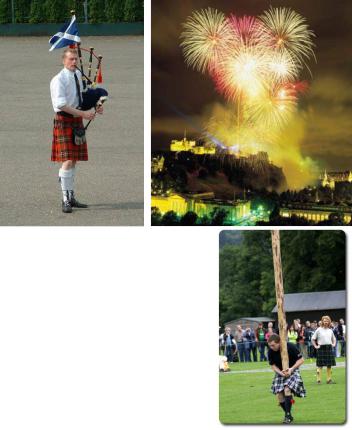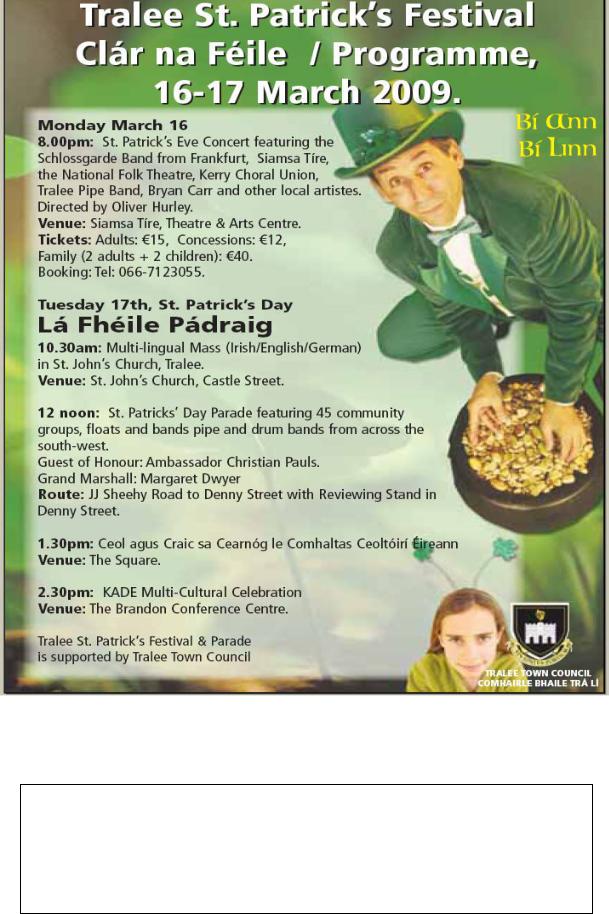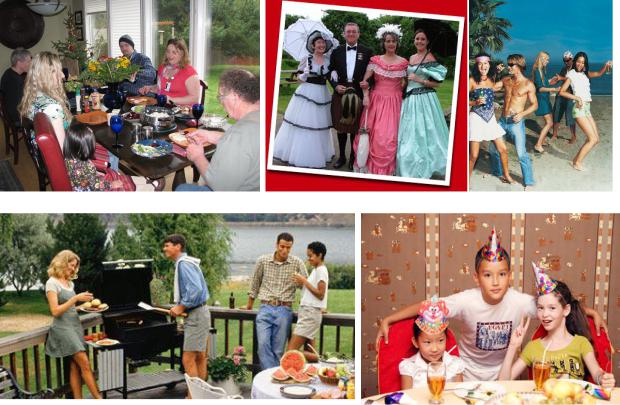
world_matters
.pdf
1What is the capital of Scotland?
2How do Scottish people celebrate the New Year?
3What is Scotland’s national dish?
4What happens at the Edinburgh Festival?
5What are the following?
abagpipes
bfirst footing
ca kilt
dtossing the caber
While-reading activities
2b Read about Scotland and check your answers for ex. 2a.
Scotland – A place to celebrate
Scotland is famous for its own culture. Here are some of the ways visitors to Scotland can join in the fun.
Hogmanay, 31 December
Scotland celebrates Hogmanay, the New Year, with the music of bagpipes, Scotland’s traditional instrument, and dancing in the street throughout the night. At midnight, there are fireworks and everyone sings ‘Auld Lang Syne’, a song by Robert Burns, a famous Scottish poet. Soon after midnight, Scottish families go ‘first footing’, visiting the houses of friends and relations to continue the celebrations!
Burns Night, 25 January
Robert Burns is Scotland’s national poet and Scottish people have a big dinner every year to celebrate his birthday. The main part of the meal is ‘haggis’, Scotland’s national dish made from liver, cereals and fat served in a sheep’s stomach. Then everyone reads poems and sings songs written by the great ‘Rabbie’ Burns himself.
The Edinburgh Festival,
August
Edinburgh is famous all over the world for its arts festival. There is an official festival for theatre, opera and classic music, and the ‘Fringe’ festival where you can see a large variety of plays, films, comedians, dance companies and concerts. Finally, there is the Military Tattoo, a military parade held in Edinburgh Castle.
The Highland Games,
May-September
Nearly every weekend in the summer, there are highland games somewhere in Scotland but the biggest games are at Cowal. People from all over the world come to watch or take part. Over three thousand bagpipes and drummers play all day and there is a wonderful atmosphere. There are highland dancing competitions as well as events like throwing the hammer or ‘tossing the caber’
– throwing a large tree-trunk as far as possible! All the athletes wear traditional skirts called kilts.
102

Factfile:
Area: 78,769 sq km Population: 5,200,000 approx Capital: Edinburgh
Political: Scotland is part of the United Kingdom but it has its own parliament, legal system, education system and its own international football team.
History: The Romans never conquered Scotland. Between the years 120 and 140 AD, they built Hadrian’s Wall, a huge wall, 118 km long, to protect their empire. In the Middle Ages, Scotland became a united country. There were many wars between England and Scotland. In 1603, the Scottish king, James VI, became king of England and a century later Scotland and England were united.
After-reading activities
2c Are these sentences true (T) or false (F)? Correct the false information.
1 Scotland is an independent country.
2Scotland has its own football team.
3The Romans conquered Scotland.
4Scottish New Year celebrations finish at midnight.
5Scotland’s national poet is Rabbie Burns
6Haggis is a vegetarian dish.
7The Highland Games at Cowal are winter games.
8The Edinburgh Festival is a classical music festival.
2d Which Scottish celebrations would these people probably prefer?
1Kim loves the theatre and classical music.
2Carol likes sport and is interested in Scottish culture.
3Lena loves parties and dancing all night.
4Peter likes poetry and trying different food from around the world.
2e Tell the class which celebration you would like to go to and give your reasons why.
103

1 Language skills
3a Fill in the gaps with the following words. There are some words you do not need.
GOING-AWAY PARTY |
BONFIRE |
RECEPTION |
PARADE |
|
COSTUME |
FEAST |
DISPLAY |
FLAG |
FIREWORKS |
CELEBRATION |
BIRTHDAY |
COMMEMORATE EVENT |
|
|
1.People of my country light a ________ in the open air at night to celebrate a religious festival
2.They are planning to ________Mother Teresa for her call to peace.
3.Tom put on a beautiful ________ during his wedding party.
4.There were hundreds of ________ displayed in the sky to welcome the national football team.
5.There was an interesting ________ at the Gallery last week celebrating a national event.
6.He proudly held the ________ of his country and made a tour around the stadium when he broke the 1500 metres record.
7.The host prepared a big ________ for the special guests
8.We're going to organise a ________ for my brother because he is going overseas for a year to study.
9.The president who visited our country last week was given an enthusiastic
________.
10.The lady lit just four candles on her fortieth ________.
Making suggestions
 3b Listen to the Lowell Festival committee meeting about the programme. How many people speak at the meeting? What are their names? Track 20.
3b Listen to the Lowell Festival committee meeting about the programme. How many people speak at the meeting? What are their names? Track 20.
Factfile
Every year the city of Lowell in the USA has a Southeast Asian Water Festival. This is a free cultural event and over 60,000 people from all over the world come to it.
 3c Listen again to the conversation and complete the missing information 1-4 on the programme.
3c Listen again to the conversation and complete the missing information 1-4 on the programme.
104

Lowell Water Festival:
August 18th-19th
River area |
Stage 1 |
|
|
Stage 2 |
|
|
||
Friday evening |
|
|
|
|
|
|
|
|
Parade by river |
Dance show |
|
|
1 |
|
(Cambodian |
||
(traditional clothes) |
(Laos national flower dance |
|
traditional then |
Malaysian |
||||
Candle ceremony |
and modern dance) |
pop) |
|
|
||||
Saturday morning |
|
|
|
|
|
|
|
|
Save Water Now |
Fashion show |
|
|
Thai boxing |
|
|
||
(talk by Professor Rees) |
(designs from Asia) |
(watch and learn) |
|
|
||||
Boat tour of river |
2 |
|
|
(learn |
Drum workshop |
|||
(history of the river and |
|
Asian styles) |
|
|
(learn to play and make |
|||
canal) |
|
|
|
|
drums) |
|
|
|
Saturday afternoon |
3 |
|
(Thai, |
|
|
|
|
|
Traditional boat races |
|
Children’s activities |
||||||
|
|
Burmese, Cambodian) |
(face painting, games) |
|||||
Saturday evening |
|
|
|
|
4 |
|
|
(Burmese) |
Short films from |
Barbecue and party |
|
|
|||||
Thailand |
($29 charge) |
|
|
|
|
|
|
|
(open air cinema) |
|
|
|
|
|
|
|
|
 3d Listen again and complete different ways of making suggestions, asking for ideas and responding to suggestions from the conversation.
3d Listen again and complete different ways of making suggestions, asking for ideas and responding to suggestions from the conversation.
suggestions
|
|
|
|
|
1 |
|
|
|
having a music show on Friday evening? |
||||||||||||
|
|
|
|
|
2 |
|
|
|
|
have traditional music and modern music. |
|||||||||||
|
|
|
|
|
3 |
|
|
|
|
to have the dance workshop in the morning. |
|||||||||||
|
|
|
|
|
4 |
|
|
|
|
Saturday evening? |
|
|
|
|
|||||||
|
|
|
|
|
5 |
|
|
|
|
have a drum concert then? |
|
|
|
|
|||||||
asking for ideas |
|
|
|
|
|
|
|
responding to suggestions |
|||||||||||||
1 |
|
|
anyone have any ideas for the |
1 |
I think |
|
|
. |
|||||||||||||
last few |
|
spaces? |
|
|
|
|
|
|
|
2 |
I’m not |
. |
|||||||||
2 |
What |
|
|
think? |
|
|
|
3 |
I don’t |
|
|
|
|
. |
|||||||
3 |
What |
|
|
to have then, Li? |
4 |
Great |
|
|
Li. |
||||||||||||
OTHER USEFUL PHRASES
Excellent. Fantastic.
That sounds fun/good/interesting/boring.
I don’t want to do that.
3e Complete these suggestions with the correct form of go, play or visit. Use each verb twice.
105

1 |
Why don’t we |
|
|
a museum this |
|||||||||
weekend? |
|
|
|
|
|
|
|||||||
2 |
Let’s |
|
|
|
tennis this weekend. |
||||||||
3 |
What |
about |
|
|
|
|
|
|
to the cinema |
||||
this weekend? |
|
|
|
|
|
|
|
|
|||||
4 |
I’d like |
|
to the theatre this |
||||||||||
weekend. |
|
|
|
|
|
|
|
|
|
||||
5 |
What about |
|
|
|
|
an art gallery |
|||||||
this weekend? |
|
|
|
|
|
|
|
||||||
6 |
I’d |
like |
|
|
|
|
|
|
football this |
||||
weekend. |
|
|
|
|
|
|
|||||||
 3f Listen to the end of the conversation and answer the questions. Track 21.
3f Listen to the end of the conversation and answer the questions. Track 21.
1Does Andy think having the food market in the afternoon is a really good idea?
2Does Andy think going for something to eat is a really a good idea?
3Does Cassie think having a burger is a really good idea?
 3g Listen to the word OK.
3g Listen to the word OK.
Which intonation shows strong interest or enthusiasm and which shows weak interest or no enthusiasm, a) or b)? Then practice with your partner.
Track 22.
 3h Listen to some more examples. Which intonation do you hear? Strong interest (SI) or weak interest (WI)? Track 23.
3h Listen to some more examples. Which intonation do you hear? Strong interest (SI) or weak interest (WI)? Track 23.
1 |
Great idea. |
3 Excellent. |
5 |
Fantastic. |
2 |
Yes. |
4. OK. |
6 |
Great. |
3i With your partner, make and respond to suggestions about this weekend. Use the language in ex. 3.c, 3.d, 3.g.
4. Speaking
4a Look at the programme for Tralee St. Patrick’s Festival. In pairs or groups:
decide and agree what to do at the festival;
make suggestions;
reply to your partner’s ideas.
Use the phrases from the Language Skills section.
106

4b Look at the photos and discuss the following:
describe what is happening at the parties
tell about the things which you prefer at parties
KEY WORDS: Parties
Kinds of party: barbecue, fancy dress, house-warming, sit-down meal Food/drink: hot drinks, snacks, soft drinks
Clothes: dress casually/smartly, wear formal/casual clothes
Activities: bring a drink, dance, give presents, listen to/make speeches, play music, sing songs
107

4c Listen to talk. Which of these statements about parties in the UK do you think are true?
1People usually wear formal clothes at parties.
2People take flowers or chocolates when they go to someone’s house for dinner.
3Teenagers sing songs and play games at parties.
 Listen and check your predictions. Track 24.
Listen and check your predictions. Track 24.
 4d Listen again and complete the phrases below.
4d Listen again and complete the phrases below.
Advice |
|
|
|
|
|
|
||||
1 |
If it’s very formal, you |
|
dress smartly. |
|||||||
2 |
Nowadays, for most parties you |
|
|
be too formal. |
||||||
3 |
It’s |
arrive late for a dinner party. |
|
|||||||
4 |
It’s |
|
|
take something with you. |
||||||
5 |
You |
|
|
|
always thank your host when you leave. |
|||||
6 |
You |
|
|
drink too much at parties. |
||||||
7 |
You |
|
|
accept a lift home from a person you don’t know. |
||||||
108
4e Look at the sentences from the radio programme. Underline the multi-part verbs.
1It depends on what kind of party it is.
2I never put a tie on.
3We get together to dance and play music.
4You don’t have to dress up.
5You can turn up when you want.
Match the verbs (1-5) above with the definitions (a-e).
ato arrive at a place
bto wear smart clothes
cto vary according to the situation
dto meet people
eto put clothes onto your body
4f Use the phrases from ex. 4.d, 4.e to prepare some advice for a foreign visitor who is invited to these celebrations in your country.
a birthday party, a wedding reception, a New Year’s Eve party
Mention the following points:
clothes to wear (male/ female)
presents to take
time to arrive
things to say
things not to do
time to leave
Work in pairs. Student A is a foreign visitor and Student B gives advice. Ask and answer questions. Then swap roles.
Example
AI’m going to a wedding. What should I wear?
BYou should wear formal clothes – a jacket and tie.
AWhat should I take?
4g Match the situations (a-e) with the expressions (1-5) below.
asomeone has passed an exam
bsome friends have had a baby
csomeone has won a match
dit’s someone’s birthday
esomeone is going to get married
109

Congratulations!
1Happy birthday! Have a lovely day!
2Well done! You played brilliantly!
3Congratulations! You worked hard for it.
4Wow! That’s brilliant. When’s the big day?
5That’s really great news. What are they going to call her?
 4hListen and repeat the underlined expressions above.
4hListen and repeat the underlined expressions above.
Work in pairs. Take turns to tell your partner some good news. Give congratulations using the expressions above. Track 25.
Example
AI’ve passed my driving test!
BThat’s great! Well done.
AThanks. I’m really pleased.
4i Tell about the differences between parties in your country and in the UK.
5. Extra Activities: Celebration of Christmas
5a Below are the descriptions of how people in different countries celebrate Christmas. Read the texts and match them with the countries.
France
Brazil
Japan
Mexico
Italy
5b Mark the words and phrases denoting the objects/events peculiar for every country.
5c Mark the words and phrases denoting the objects/events common for all the countries.
1.
The festivities start on December 16. Each night for nine nights before Christmas, families go to each other's homes for parties, or posadas. Each posada starts with a parade of all the guests. The paraders
go to a door of the host's house and knock. The host calls out that there is no room in his house. The guests continue to sing and knock, and finally they are invited in. The holy
110
figures are placed on an altar and the |
midnight, the people go to church. |
||||||||||||
people pray and sing. |
|
|
|
After church, a large feast is held. |
|||||||||
On Christmas Eve, the largest |
Sometimes gifts are exchanged, but |
||||||||||||
posada of all is held. There are |
children often wait until King's Day |
||||||||||||
fireworks |
and |
noisemakers. |
At |
(6 |
Jan) |
to |
receive |
gifts. |
|||||
In this country |
2. |
|
|
|
|
|
|
|
|
|
|
||
Christmas arrives |
beach and participate in an African |
||||||||||||
at the beginning of summer. There is |
spiritualist |
ceremony |
that |
honors |
|||||||||
no snow or cold, but in spite of the |
'Lemanja', the goddess of the sea. |
||||||||||||
heat, Santa Claus known here as |
Then on Epiphany or Three Kings' |
||||||||||||
"Papai Noel" wears the traditional |
Day Children put their shoes beside |
||||||||||||
costume as seen in countries where it |
the window or outside the door, |
||||||||||||
is winter. The celebration runs from |
hoping to find them filled with treats |
||||||||||||
December 25th to Jan 6th (Three |
the next day, supposedly by the three |
||||||||||||
Kings' Day), lasting 12 days. People |
wise men. This officially ends the |
||||||||||||
attend Mass on Christmas Eve, where |
Christmas season. |
|
|
||||||||||
the Christmas story is retold. One |
|
|
|
|
|
|
|
||||||
week later on New Year's Eve, many |
|
|
|
|
|
|
|
||||||
people will |
flock to |
Copacabana |
|
|
|
|
|
|
|
||||
|
|
|
3. |
|
|
|
|
|
|
|
|
|
|
Most families enjoy two creches |
by Pere Noel. Birch sticks are |
||||||||||||
(Nativity Scene). The first is in their |
sometimes left as a reminder to be |
||||||||||||
own church. The other is at home. |
good. Ashes from the Yule log are |
||||||||||||
Holly and greens are purchased for a |
saved and used during the year to |
||||||||||||
backdrop. A lighted star is always |
ward off sickness, or other |
||||||||||||
suspended over the creche. The |
misfortunes. |
|
|
|
|
|
|||||||
family gathers around and sings |
The children go to bed early to |
||||||||||||
carols as the Jesus is placed in the |
dream of their Christmas miracle. |
||||||||||||
manger. The three kings are placed |
They place wooden shoes near the |
||||||||||||
there on Epiphany eve, (6 Jan). A |
fireplace or under the tree. The shoes |
||||||||||||
special cookie is baked. Some feel it |
are filled with candies, oranges and |
||||||||||||
must first be shared with needy |
chestnuts. Christmas |
presents are |
|||||||||||
people. |
|
|
|
|
|
|
given on New Year's Day. |
|
|||||
Christmas Eve is for gift giving, |
|
|
|
|
|
|
|
||||||
Shoes are left by the fire to be filled |
|
|
|
|
|
|
|
||||||
Several |
days |
|
4. |
|
|
|
|
|
|
|
|
|
|
before Christmas, |
bagpipes, flutes and oboes, on which |
||||||||||||
children go door to door singing |
they play sweet holiday music. On |
||||||||||||
favorite Christmas carols. They are |
Christmas Eve, many candles are lit |
||||||||||||
often accompanied by pipers wearing |
as the children in the family take |
||||||||||||
bright red jackets and broad-brimmed |
turns |
telling |
the |
wonderful |
story of |
||||||||
hats with red tassels. |
They |
carry |
|
|
|
|
|
|
|
||||
111
